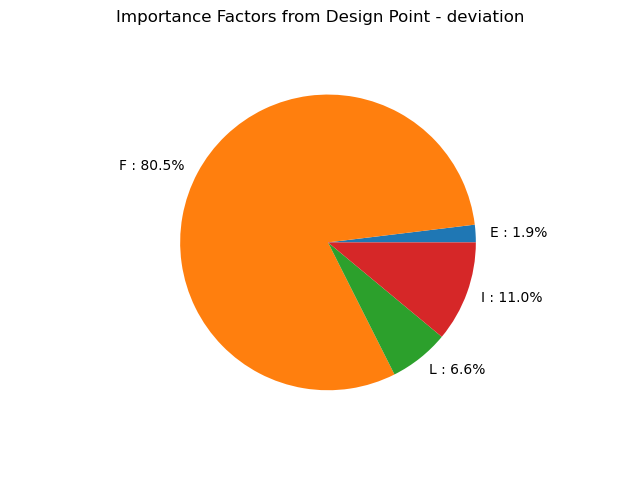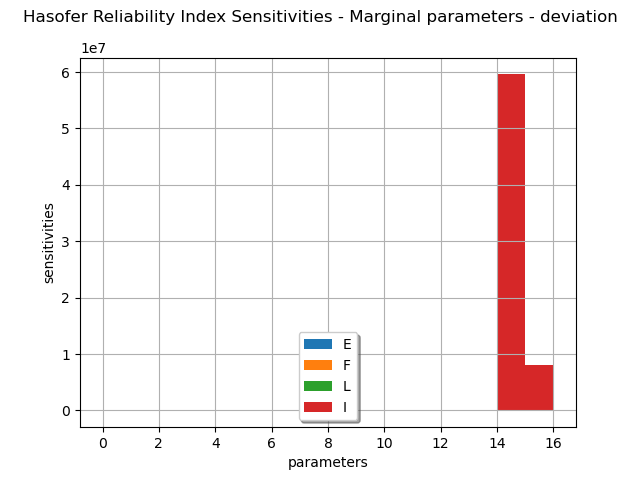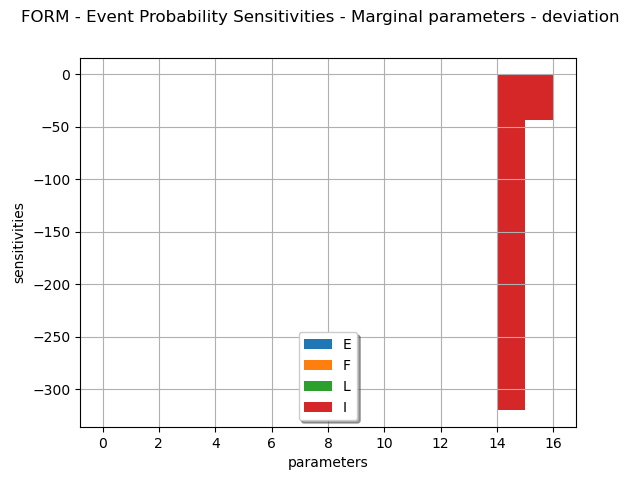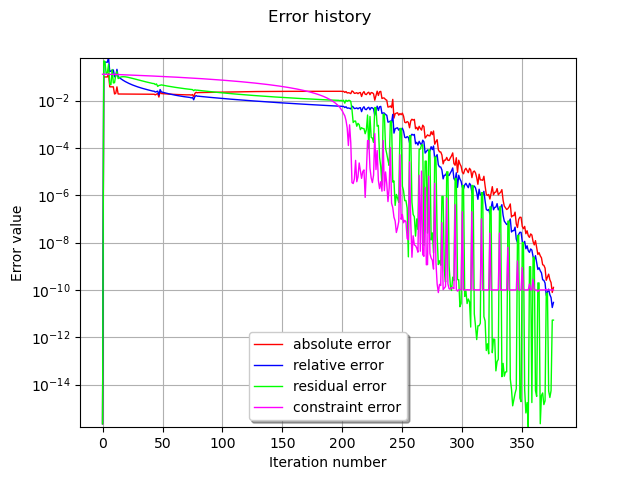Note
Click here to download the full example code
Estimate a probability with FORM¶
In this example we estimate a failure probability with the FORM algorithm on the cantilever beam example. More precisely, we show how to use the associated results:
the design point in both physical and standard space,
the probability estimation according to the FORM approximation, and the following SORM ones: Tvedt, Hohen-Bichler and Breitung,
the Hasofer reliability index and the generalized ones evaluated from the Breitung, Tvedt and Hohen-Bichler approximations,
the importance factors defined as the normalized director factors of the design point in the
-space
the sensitivity factors of the Hasofer reliability index and the FORM probability.
the coordinates of the mean point in the standard event space.
The coordinates of the mean point in the standard event space is:
where is the spheric univariate distribution of the standard space and
is the reliability index.
Model definition¶
from __future__ import print_function
import openturns as ot
import openturns.viewer as viewer
from matplotlib import pylab as plt
ot.Log.Show(ot.Log.NONE)
We load the model from the usecases module :
from openturns.usecases import cantilever_beam as cantilever_beam
cb = cantilever_beam.CantileverBeam()
We use the input parameters distribution from the data class :
distribution = cb.distribution
distribution.setDescription(['E', 'F', 'L', 'I'])
We define the model
model = cb.model
Create the event whose probability we want to estimate.
vect = ot.RandomVector(distribution)
G = ot.CompositeRandomVector(model, vect)
event = ot.ThresholdEvent(G, ot.Greater(), 0.3)
event.setName("deviation")
Define a solver
optimAlgo = ot.Cobyla()
optimAlgo.setMaximumEvaluationNumber(1000)
optimAlgo.setMaximumAbsoluteError(1.0e-10)
optimAlgo.setMaximumRelativeError(1.0e-10)
optimAlgo.setMaximumResidualError(1.0e-10)
optimAlgo.setMaximumConstraintError(1.0e-10)
Run FORM
algo = ot.FORM(optimAlgo, event, distribution.getMean())
algo.run()
result = algo.getResult()
Probability
result.getEventProbability()
Out:
1.0900370418627411e-06
Hasofer reliability index
result.getHasoferReliabilityIndex()
Out:
4.735972259888527
Design point in the standard U* space.
result.getStandardSpaceDesignPoint()
[-0.665643,4.31264,1.23029,-1.3689]
Design point in the physical X space.
result.getPhysicalSpaceDesignPoint()
[6.56566e+10,458.976,2.58907,1.34803e-07]
Importance factors
graph = result.drawImportanceFactors()
view = viewer.View(graph)

marginalSensitivity, otherSensitivity = result.drawHasoferReliabilityIndexSensitivity()
marginalSensitivity.setLegends(["E","F","L","I"])
marginalSensitivity.setLegendPosition('bottom')
view = viewer.View(marginalSensitivity)

marginalSensitivity, otherSensitivity = result.drawEventProbabilitySensitivity()
marginalSensitivity.setLegends(["E","F","L","I"])
marginalSensitivity.setLegendPosition('bottom')
view = viewer.View(marginalSensitivity)

Error history
optimResult = result.getOptimizationResult()
graphErrors = optimResult.drawErrorHistory()
graphErrors.setLegendPosition('bottom')
graphErrors.setYMargin(0.0)
view = viewer.View(graphErrors)

Get additional results with SORM
algo = ot.SORM(optimAlgo, event, distribution.getMean())
algo.run()
sorm_result = algo.getResult()
Reliability index with Breitung approximation
sorm_result.getGeneralisedReliabilityIndexBreitung()
Out:
4.915018845541476
… with Hohenbichler approximation
sorm_result.getGeneralisedReliabilityIndexHohenbichler()
Out:
4.92039449786118
sorm_result.getGeneralisedReliabilityIndexTvedt()
Out:
4.923707817325711
SORM probability of the event with Breitung approximation
sorm_result.getEventProbabilityBreitung()
Out:
4.4386959812405156e-07
… with Hohenbichler approximation
sorm_result.getEventProbabilityHohenbichler()
Out:
4.31849736540921e-07
… with Tvedt approximation
sorm_result.getEventProbabilityTvedt()
plt.show()
Total running time of the script: ( 0 minutes 0.405 seconds)
 OpenTURNS
OpenTURNS